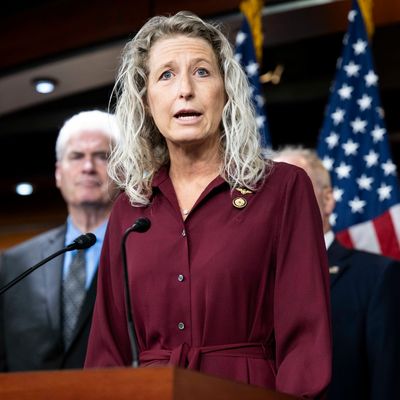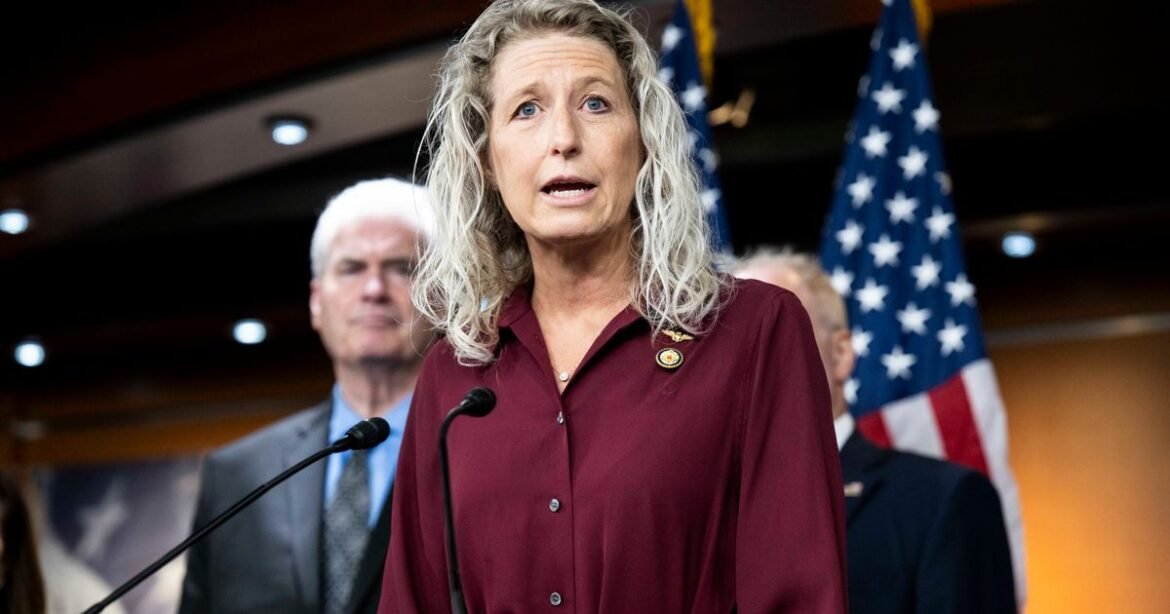
Is legislation from the obscure backbench House Republican Jen Kiggans the key to avoiding a government shutdown?
Photo: Michael Brochstein/ZUMA/Reuters
At midnight on September 30, the government funding patch Congress enacted in March will expire. That means major federal functions will shut down if Congress and Donald Trump don’t intervene. The time frame for keeping the government open is actually shorter than that, since the House and Senate plan to be in recess for the Rosh Hashanah holiday on the week of September 22.
Unlike the budget-reconciliation procedure that led to the enactment of the One Big Beautiful Bill, appropriations measures can be filibustered in the Senate, so Republicans need Democratic votes to keep the government open. And the congressional minority is not particularly inclined to cooperate on another bipartisan spending patch as Democratic activists were incensed by their leaders’ cave on spending back in March. At a minimum, Democrats will need significant trophies if they are to supply the seven or eight Senate votes needed to quash a filibuster.
The most obvious trophy would be Trump agreeing to put the kibosh on his Office of Management and Budget director Russell Vought’s provocative efforts to cancel previously appropriated spending by executive fiat, which has made Vought a devil figure to people on both sides of the aisle in Congress (not that the Republicans will say anything publicly). In the unlikely event the president did rein in Vought, that might not be enough to tempt Democrats into a spending deal since the threat of a government shutdown is their only bit of leverage for the foreseeable future. Senator Elizabeth Warren has suggested she would only vote for a spending bill if Republicans agreed to scrap the Medicaid cuts in the OBBBA, which is about as likely as Rand Paul joining the Democratic Socialists.
There is one thing that could lure Democrats into voting to keep the government open: a bipartisan effort to extend the tax credits (set to expire at the end of the year) that make Obamacare premiums affordable for a lot of middle-class Americans who get their health insurance from the exchanges created by the Affordable Care Act. As Punchbowl News reports, Republicans are nervous about the spikes in premiums, which will happen as early as November 1 (when open enrollment for Obamacare policies begins) if Congress doesn’t act to extend the subsidies:
Letting the premium subsidies lapse could lead to more than 4 million people losing health insurance, according to the CBO. Longtime Trump pollster John McLaughlin recently said the issue would be the party’s “greatest midterm threat.”
Inflation and rising costs of living are already a looming political liability for the GOP heading into 2026. Republicans are also under heavy fire for the Medicaid cuts in the One Big Beautiful Bill. So the Obamacare cliff could make those problems worse.
Let’s be clear: Republicans are in charge of Washington, so if premiums go up or huge chunks of Americans lose their health-care coverage entirely, the GOP will get the blame. They privately acknowledge that.
On the other hand, most Republicans hate Obamacare, and for the House Freedom Caucus types who wield so much influence in the party right now, the idea of working with Democrats to salvage premium subsidies is anathema to everything they believe. It is theoretically possible, however, to discern a potential bipartisan coalition to get this done, and it could be a crucial lubricant for negotiations on a more general spending patch as well. There’s even a legislative vehicle in place, per Punchbowl News:
A group of vulnerable House Republicans and moderate Democrats is introducing a bill that would extend the subsidies for a year, pushing the deadline beyond the midterms. This could cost around $24 billion, based on the CBO’s estimate last year.
Rep. Jen Kiggans (R-Va.) is leading the bill along with GOP Reps. Brian Fitzpatrick (Pa.), Rob Bresnahan (Pa.), Carlos Gimenez (Fla.), David Valadao (Calif.), Young Kim (Calif.), Jeff Hurd (Colo.), Tom Kean (N.J.) and Juan Ciscomani (Ariz.). Democratic Reps. Tom Suozzi (N.Y.) and Jared Golden (Maine) have signed on, too.
As a sign of the GOP Zeitgeist, Representative Jen Kiggans professes to dislike the Obamacare subsidies but argues they should be carefully phased out rather than abruptly terminated. So in any potential deal the length of the extension could be a big sticking point. And if extending the subsidies indeed becomes the glue that could seal a spending patch, there remain a host of disagreements over the length of the patch and whether any spending reductions accompany it.
Aside from the partisan dynamics in the House and Senate, the entire health-care industry is mobilizing a lobbying blitz to save the subsidies, which are of particular concern to the health insurers that pocket them. Their efforts should keep things bubbling in Congress even if Democrats and Republicans are loathe to reach a deal. It’s possible Democrats will insist on at least a brief government shutdown to show “the base” they are willing to fight Trump’s power grabs. But the unlikely topic of Obamacare could yet provide a bit of bipartisanship amid the chaos and authoritarianism of Trump’s Washington. Some Democrats who might otherwise consider a deal could look out their windows and see National Guard troops patrolling and balk at any accommodation of the GOP.

